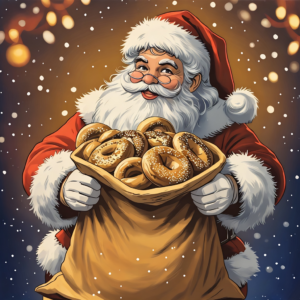
Stories abound of Jewish people who grow up warm and secure in their faith. Those for whom the eight days of Hanukah didn’t compete with Christmas: Jewish nurses, firefighters, and doctors (the ones my mother wanted me to marry) who took Christmas Eve shifts to ensure that their Christian brethren were home for the holidays—the lucky Jews with traditions of eating Chinese food and watching a movie on Christmas.
I wasn’t one of them.
I grew up with my nose pressed to both sides of the glass. Like any other bird, blind to the barrier between the glowing scene inside and me, I banged until my nose almost broke.
Hanukkah traditions never made it to my house. (Adam Sandler’s Hanukkah songs still make me blue with envy.) Not a dreidel abounded (though we had tasty potato kugel at my grandmother’s house—but I think that might have been Passover. (Color me holiday confused.)
And naturally, I longed for the sparkles of Christmas. One year, my sister and I even hung stockings. What were we thinking? That the keys to the kingdom lay in our old limp socks? Mom was out on a date; we stayed up as late as possible until exhausted; we went to bed giddy with the prospect of what would be spilling out the tops of those socks. Like in the books! Like the movies! All we’d previously needed were the smarts to put our socks out!!!
We didn’t know what Christmas stockings should or would hold, but we knew these socks must be pretty darn special for the entire world to discuss—Merry Christmas! Merry Christmas! Merry Christmas.!!!!
My poor mother either didn’t notice the socks or, more likely, swore at us for leaving our clothes all over—whatever she thought, no sparkles greeted us that Christmas morning. (Though, not to present us as all-pathetic: as seen below, we did have dolls in our Brooklyn apartment!)
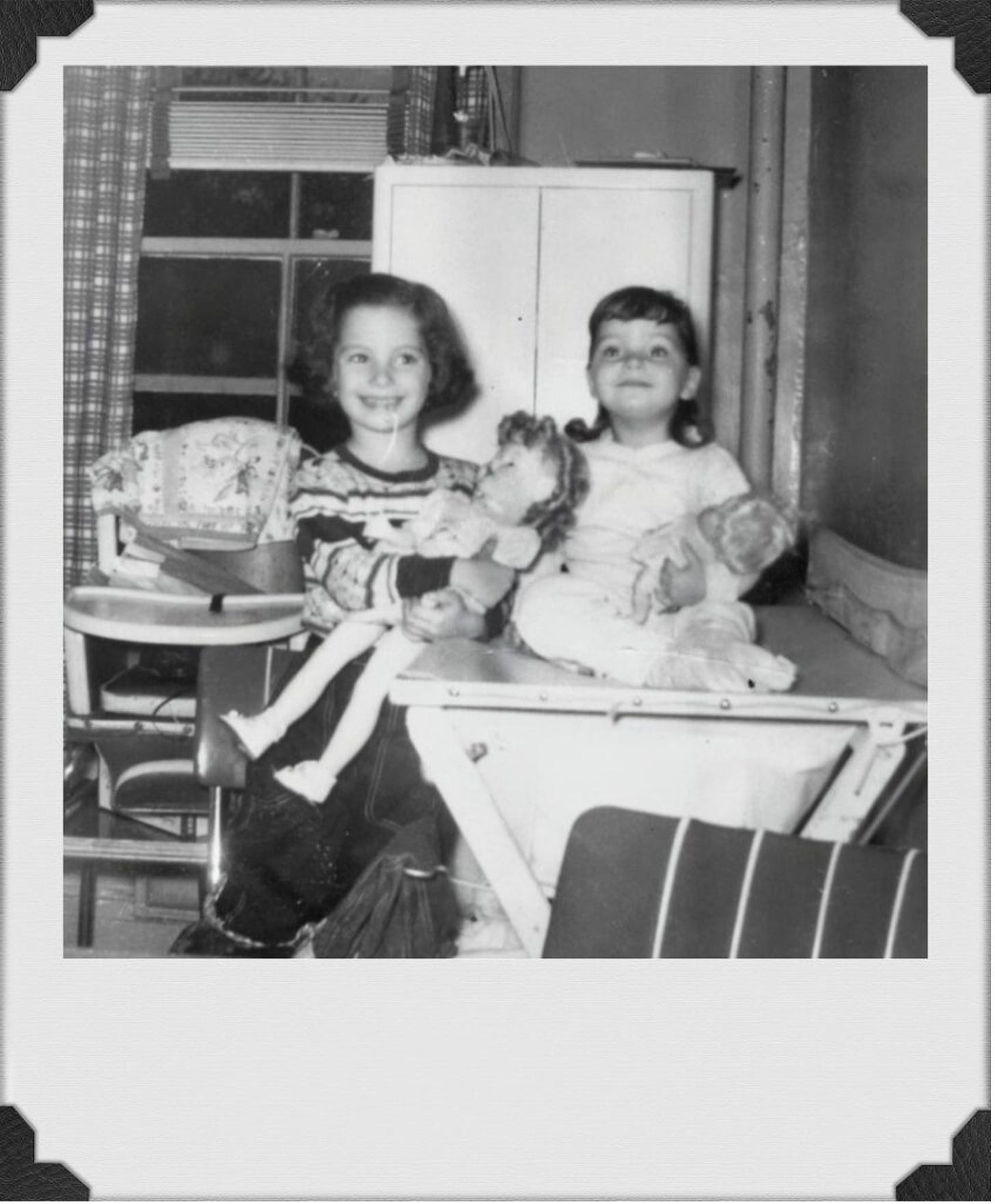
I spent one Christmas with my friend Bobbi’s family, trying to be as adorably Christian as possible so they’d invite me back.
They did not. Was I too eager? Should I have played hard-to-get? (I do look kind of pleading-eyes desperate in this photo below, with Bobbi in our Ditmas Junior High years.)

As a teen, I went out with my similarly Christmas-deprived Jewish best friend on Christmas Eve and bought a tiny Charlie Brown-style pathetic tree. We put it up in her room, decorating it with God knows what. I do remember hanging up our long, dangling hippy earrings. Her mother rolled her eyes.
Finally, I left home and gave up the Christmas ghost for a few blessed too-cool-for-holiday years.
Then I became a mother. A super-young twenty-one-year-old mother.
Christmas reared its head. I swore my children would have a giant piece of American pie! Why shouldn’t Santa love us? At the time, we lived with a non-Jewish couple in a big old Victorian House, and I fell into Christmas as though I were Jesus’ sister.
Could Santa love a Jewish girl???
Religion played no role for any of us; my outsider status faded as we celebrated an orgy of food, presents, lights, goodwill, and Christmas stockings so full we needed overflow bags, but the flies in my Christmas pie were friends (most of who’d never stepped in a church) exclaiming, as though I were crashing a car festooned with Stars of David through their gates of heaven, “What!!! You celebrate Christmas?”
As the kids got older and we lived by ourselves, the cracks showed in my crazed Christmas fantasy. I considered retreating into a Hanukah-only celebration but had nothing to draw on. I saved all my Jew mojo for Passover, not having any Easter envy, possessing Passover role models, and loving the rituals of that holiday—and I’d shared Passover with my friends, just as they’d shared Christmas with me.
Now, I was determined to make this holiday fit who we were—outliers of all holidays, celebrants of almost all, and we began celebrating a Chrismanukah sort of holiday—mixing menorahs with elves.
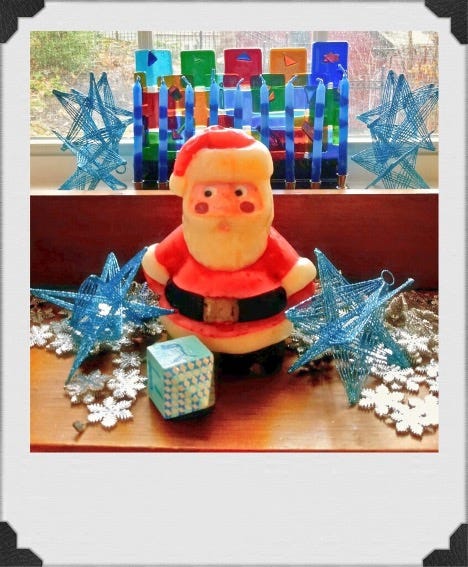
Still, unease weighed on me. I felt like Barbra Streisand in “The Way We Were.” Santa was the Robert Redford I’d never genuinely possess. He’d hung out with me for years but never really committed. Santa became my married man, my bad boy.
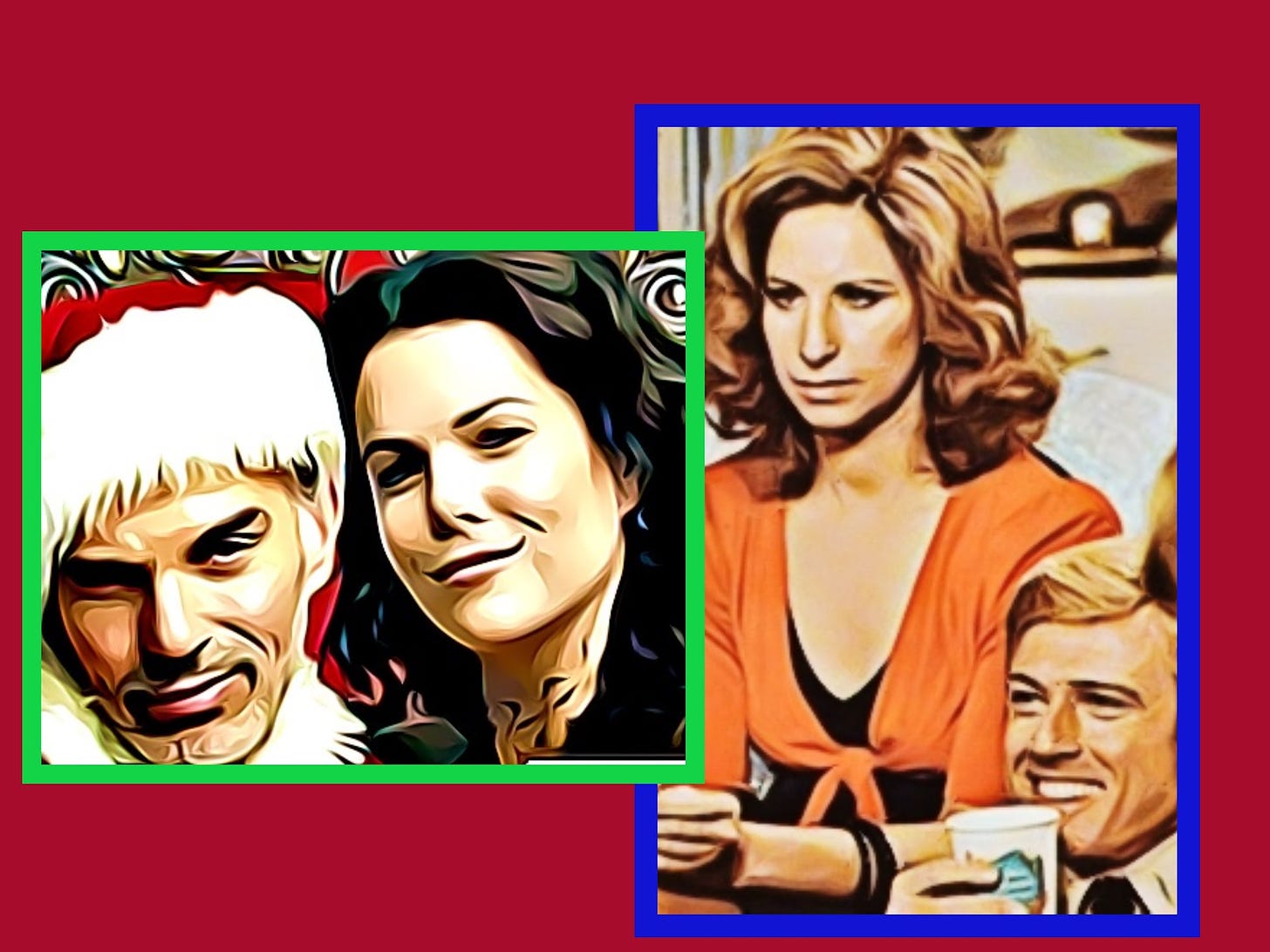
Now, my kids were much older. Young-adult-type-older.
And I re-married. (Not to Santa—to a man who knew his way around a bar mitzvah. And understanding man.)
Slowly, my trees went from light-crusted evergreen to a miniature rosemary tree to a weird steel Crate & Barrel thing; sentimental ornaments line my window along with Stars of David and a Rabbi on a Shelf we’d been gifted. My holiday morphed from empty socks to dripping tinsel to latkes and macaroons laced next to candy canes (and always bagels.) Orgies of presents flipped from being Chanukah-wrapped to sporting Christmas paper and back again.
Forgive me this day, my ongoing Santa jealousy. Growing up in a world where something is shining on a mountain is hard, especially when you think everyone except you is allowed to climb to the top and grab the star.
But now I’m older. I try to see more clearly. I hope I’ve given my daughters a fun merry-go-round of cultural inclusion and the knowledge that we belong—end of story.
Was it such a sin to dip a Jewish toe into this holiday ocean of goodwill? I envied those who could turn their backs, but I didn’t have the will to spend the day at the movies.
One year, when the kids were away, we went almost full-on Hanukkah: To the great glee of my husband, who’s been generous and kind in his acceptance of his once-a-year-faux-Shiksa wife, we returned to our roots by watching movies and eating pan-fried ravioli. But, of course, on Dec 25, I woke up feeling bleak and empty-socked, wondering if Santa and I were finally breaking up or just on a break.
Years ago, my Christmas soul-searching began with a plaintive pathetic plea: “Santa Baby, can you love a Jewish girl?”
Today, I know what my head-long plunge into my insane version of the Christmas-Hanukkah-Macaroon-Candy-Cane Kitchen-Sink holiday represents. Like every human on this earth, my past shaped me, and like all those with wonky pasts, we want to belong and we want to fit in.
Some of us learn from experience; some suffer forever—with luck, we knit new ways to stay warm in this sometimes cold world.
When my daughters’ father fries a batch of mouth-watering latkes, he feeds them love with crispy potatoes. I know he understands that my bagels and Christmas stocking combos are also love.
Gifting those I love makes me extraordinarily happy. Watching my grandson smile when he holds just the right book, my daughters wrapped in the softest of scarfs, my son-in-law happy, holding exactly what he put on his list, and pretending to like the Planned Parenthood hat, and my (ever-patient) husband laughing as socks explode from a box brings me joy.
When I invited Santa to the party, he came despite our perhaps mutual Streisand/Redford discomfort. When I light the Menorah, I feel a past I wish had been mine, though it hadn’t been. But I remember that I shape today and tomorrow.
Traditions don’t have to be hidebound—they can be newly sparkled.
When my husband schleps out at 7 a.m. to get the freshest bagels at Rosenfeld’s for Christmas morning, he gifts me with his open heart, showing me the most genuine love as we build on our convoluted traditions.
This man took me to a gingerbread house workshop!
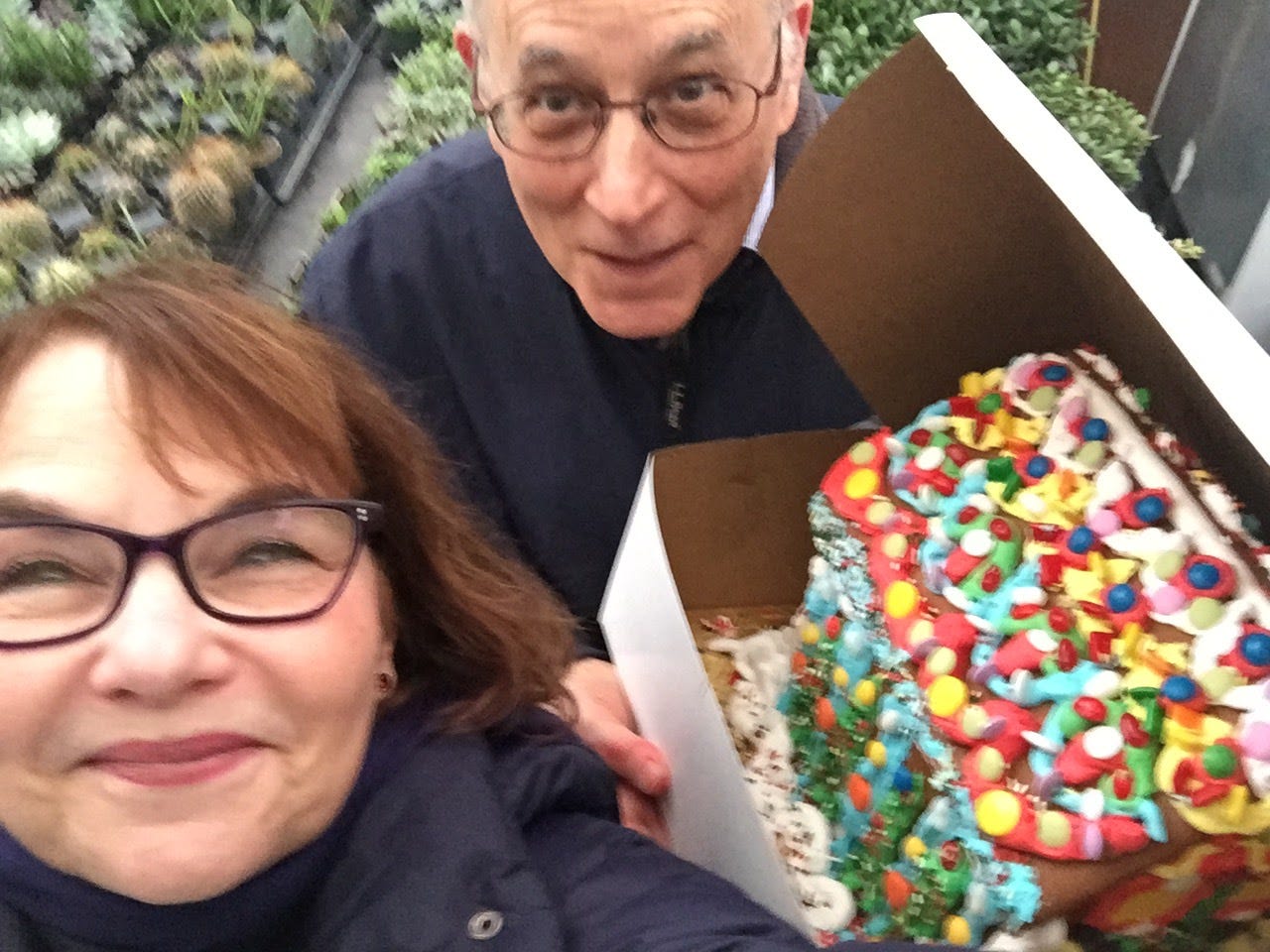
Is my holiday mixed up? Yes. But millions of wars have been fought and millions killed in the name of religion—I’ll take my swirling mess of a holiday.
My family includes a plethora of identities—cultural, religious, gender spectrum, talents, neuro, city, country—perhaps if all of us opened our hearts to a bit of borrowing and a cup of kindness about sharing, we’d build a more loving world.
And now, this year, ’tis the season of a creeping fear. Will Christian Nationalism spread further? Will the creeping specter of anti-Semitic impulses be normalized with this new administration?
Will hate, sanctified by political impulses clothed in supposed Christian values, have a heyday in 2025?
Or will Jesus, that nice Jewish boy, a do-gooder who I see through the eyes of the Unitarian Universalists, described by Rev. Dawn Skjei Cooley as “a man who healed the sick, fed the hungry, and clothed the poor. He did something about the suffering he saw around him because he felt connected to those who suffered,” imbue a message of love and kindness to his followers?
This is my struggle and my question leading up to 2025: Will the holiday season see our neighbors retreating into armed camps of religion, each declaring their way the one true way?
Or is it possible for the plethora of religions to get a non-hatred clause with a common goal of goodness, kindness, anti-hate, and acceptance of everyone’s rights to exist as they are?
I’ll sign up for that; I’ll sign up for borrowing cups of fun from each other.
Tell you what, my fellow citizens, you take eight nights of presents, and I’ll enjoy sparkling lights all over the house. I’ll happily indulge in unity and creativity and share the tenet of never mistreating relatives, orphans, or neighbors.
For 2025, I’m declaring this: I don’t have to ask if Santa loves me; I’m deciding he’s simply happy to be loved.
Santa’s not my secret lover, longed-for boyfriend, or even a close buddy. Nope. He’s a fun friend who loves presents and glitter and offers a bit of magic. He’s a once-a-year fling, complete with tasty cookies.
Santa is a heck of a good-time Charlie.
But Santa can’t begin to compete with my bagel-man, who knows that kindness and love belong to no one group.